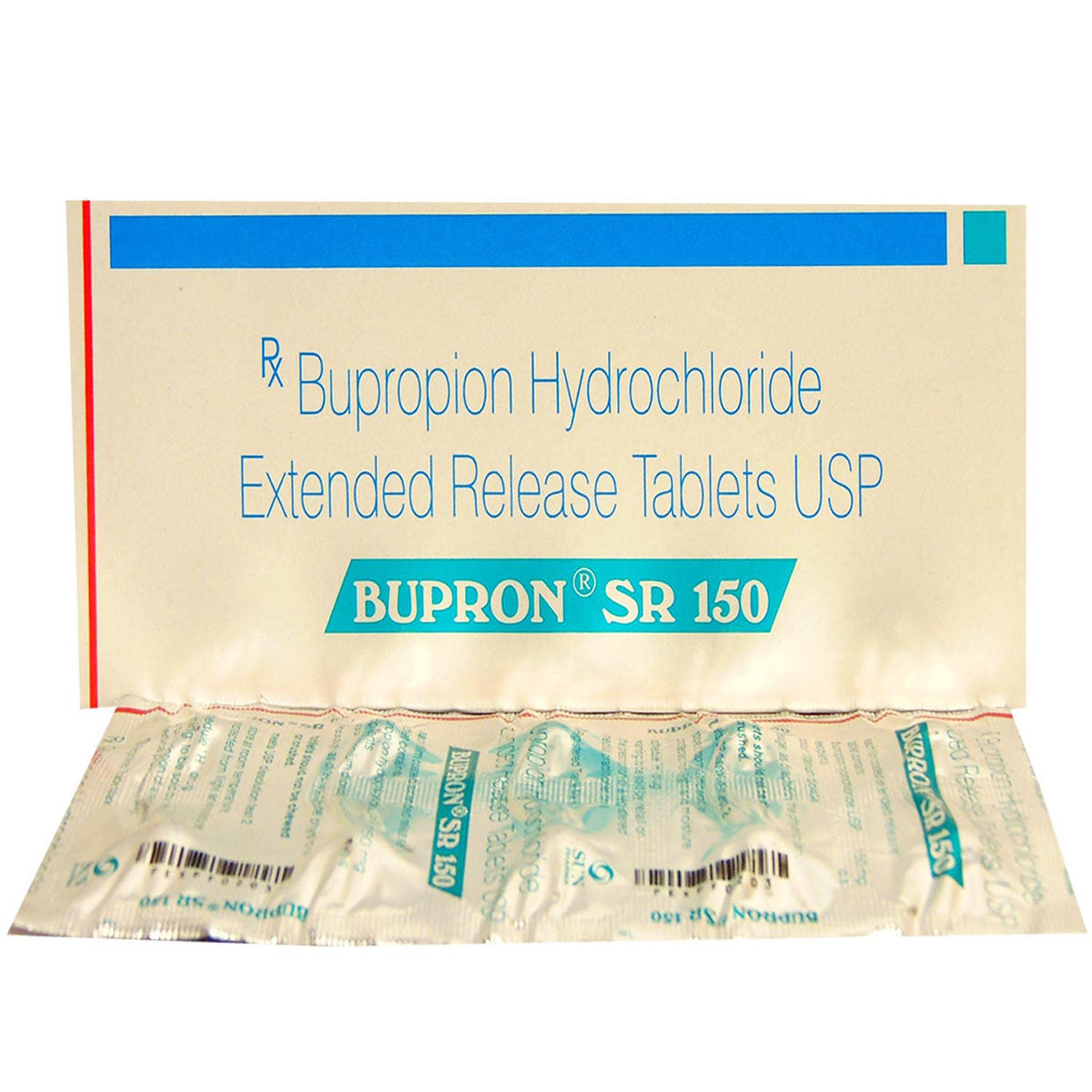Bupropion
About Bupropion
Bupropion is used in the treatment of depression. It’s also used to help people stop smoking. Depression is a mood disorder that affects day to day life of a person. A person may have symptoms such as feeling sad or feeling lost and might have mood swings.
Bupropion contains Bupropion, which is used to treat depression. It works by increasing the level of a chemical messenger (serotonin) in the brain responsible for improving mood and physical symptoms of depression. Hence, it helps to improve mood.
Take Bupropion as prescribed by your doctor. You are advised to take Bupropion for as long as your doctor has prescribed it for you, depending upon your medical condition. In some cases, you may experience certain common side effects, such as nausea, headache, dizziness, vomiting, insomnia (difficulty in sleeping), fever, constipation, sweating, allergic reaction, impaired concentration, and dry mouth. Most of these side effects do not require medical attention and will resolve gradually over time. However, you are advised to consult your doctor if you experience these side effects persistently.
Do not take Bupropion if you are allergic to Bupropion or its ingredients. Tell your doctor if you are taking antidepressants, antipsychotic medication, or antihypertensives, especially if you are taking an MAO inhibitor (medicine to treat depression). Try not to stop taking Bupropion of your own, as it may lead to unpleasant side effects. Let your doctor know about this, as it may cause withdrawal symptoms. Bupropion is used with caution in children and adolescents under 18 years of age as it increases suicidal tendencies in this population. It is also habit-forming, so always take it in the dose and duration prescribed by a doctor, and never self-medicate.
Uses of Bupropion
Medicinal Benefits
Bupropion belongs to a class of drugs known as 'antidepressant', which contains Bupropion primarily used in treating depression. In addition to this, it is also used by people who are addicted to smoking. It works by increasing serotonin levels. Serotonin is a chemical messenger in the brain responsible for improving mood and physical symptoms of depression. Hence, it helps to improve mood.
Directions for Use
Storage
Side Effects of Bupropion
- Nausea
- Headache
- Dizziness
- Vomiting
- Insomnia (difficulty in sleeping)
- Tremors, feeling anxious or nervous
- Fever
- Weight loss
- Muscle pain
- Constipation
- Sweating
- Allergic reaction
- Impaired concentration
- Dryness in mouth
Drug Warnings
Do not take Bupropion if you are allergic to Bupropion or its ingredients. Tell your doctor if you are taking antidepressants, antipsychotic medication, or antihypertensives, especially if you are taking MAO inhibitors (medicine to treat depression). Patients with liver diseases, diabetes, heart disease and bleeding disorders should use Bupropion with caution. Please do not stop the treatment abruptly, as it can cause withdrawal reactions. Bupropion may cause suicidal thoughts and worsen anxiety. Bupropion is used with caution in children and adolescents under 18 years of age as it increases suicidal tendencies in this population. It is also habit-forming, so always take it in the dose and duration prescribed by a doctor, and never self-medicate.
Drug Interactions
Drug-Disease Interaction: Bupropion is known to interact in patients with bipolar disorder (manic depression), bleeding or blood clotting disorder, drug addiction or suicidal thoughts, liver or kidney disease, seizures, low levels of sodium in your blood, cardiovascular disorders like high blood pressure, chest pain (angina) and coronary artery disease.
Drug-Food Interaction: Bupropion may interact with alcohol, multi-mineral or other herbal/ayurvedic supplements. So, if you are using any OTC items, please tell your doctor.
Drug-Drug Interaction: Bupropion is known to interact with medicines to treat asthma (theophylline), pain (tramadol), depression (desipramine, isocarboxazid, phenelzine, selegiline, imipramine, paroxetine, citalopram, escitalopram), mental illness (risperidone, thioridazine), Parkinson’s disease (levodopa, amantadine), high blood pressure (metoprolol), heart problems (propafenone, flecainide), HIV (ritonavir, efavirenz), cancer (cyclophosphamide).
Drug-Drug Interactions Checker List:
Safety Advice

Alcohol
unsafeAvoid consumption of alcohol while taking Bupropion as it may cause serious side effects.

Pregnancy
unsafeBupropion is a pregnancy category B drug. If you already take this medicine before becoming pregnant, consult your doctor immedietly. It can pose a small risk of problems for an unborn baby. Your doctor might prescribe this medicine during pregnancy if the benefits outweigh the risks.

Breast Feeding
unsafeIn very small quantities, Bupropion enters the breast milk and may have negative effects on breastfed babies. If the infant is in good health, it may be prescribed. Please see your doctor, though, if the baby stops eating as well as usual after taking Bupropion or starts sleeping a lot more than usual.

Driving
unsafeDo not drive after taking Bupropion as it may cause drowsiness and interfere with your driving ability.

Liver
cautionBupropion to be taken with caution, especially if you have a history of liver diseases. Your doctor may adjust the dose if required based on your condition.

Kidney
cautionBupropion to be taken with caution, especially if you have a history of kidney disease. Your doctor may adjust the dose if required based on your condition.

Children
unsafeBupropion is not recommended for use in children below 18 years. Its safety and efficacy are not established in children.
Habit Forming
Diet & Lifestyle Advise
Do regular exercise, which can help lower anxiety by releasing endorphins and improving your sleep.
Find humour in your daily life. Try to watch light-hearted shows to help relieve stress.
You can try increasing your mindfulness by including yoga, meditation, cognitive therapy and mindfulness-based stress reduction.
Drink enough water to stay hydrated and limit consumption of alcohol and caffeine to relieve anxiety.
Include a diet rich in whole grains, vegetables and fruits. This is a healthier option than eating a lot of simple carbohydrates found in processed foods.
Herbs like turmeric, ginger and chamomile contain anti-inflammatory properties. Including these stuff in meals can reduce inflammation caused due to anxiety disorder.
Reduce your alcohol, caffeine, added sugar, high salt and fat intake. Especially transfat may help also help reduce inflammation.
You should include antioxidants in your daily diet like ashwagandha, omega-3 fatty acids, green tea and lemon balm.
Try to spend time with your friends and family. Having a strong social network may help you lower your risk of anxiety.
Special Advise
Bupropion causes drowsiness. Avoid doing activities that require your complete focus and attention, like driving when on this drug.
An abrupt stoppage of Bupropion can lead to significant withdrawal symptoms. Always discuss with your doctor about decreasing the dosage before completely stopping its usage.
Avoid consuming alcohol while on this medication, as it can lead to dangerous side effects.
Bupropion is unsafe for usage if you're pregnant or are planning to get pregnant. Discuss with your doctor about changing/replacing the medicine with safer alternatives.
Do not self-medicate.
Patients Concern
Disease/Condition Glossary
Depression: It is a mood disorder that interferes with a person's daily life. A person may experience symptoms like sadness or a sense of loss, as well as mood swings. Arthritis, asthma, cardiovascular disease, cancer, diabetes, and obesity are conditions that can get worse in depressed people.
FAQs
Bupropion is used in the treatment of depression. It is also used to help people stop smoking.
Bupropion contains Bupropion, primarily used in treating depression. In addition to this, it is also used by people who are addicted to smoking. It works by increasing serotonin levels. Serotonin is a chemical messenger in the brain responsible for improving mood and physical symptoms of depression. Hence, it helps to improve mood.
Certain side-effects of Bupropion can be dealt with simple tips such as if you experience dry mouth, you can chew sugar-free gum or take sugar-free sweets. If you are sweating a lot while taking Bupropion, wear loose clothing and use a strong antiperspirant. If you cannot sleep after taking Bupropion, prefer to take it in the morning to avoid sleep disturbances. If you feel sleepy after taking Bupropion, avoid taking it in the evening and limit your alcohol intake. If you feel tired or weak after taking Bupropion, sit or lie down until you feel better. If you feel that the side effects are worsening, please consult your doctor.
Yes, however, there may be an increased risk of experiencing suicidal tendencies in children, adolescents and young adults. This medicine is not recommended for children less than 18 years of age.
Taking Bupropion in more than the recommended dose can cause unpleasant side effects such as dizziness, tremor, agitation, convulsion, coma, nausea, vomiting, changes in heart rhythm, decreased blood pressure and change in body fluid/salt balance.
In elderly patients, the risk of side effects is more if you are taking Bupropion. For the patients who are elderly, dose adjustment might be required, or your doctor might prescribe any other medication safe for the elderly.
Bupropion is not advised in cases if you are allergic to Bupropion, have epilepsy (seizure disorder or fits), diabetes, sexual disorders, liver or kidney disease, any heart problems, bleeding or clotting disorders, or currently taking medicines for depression known as MAO inhibitors (such as Isocarboxazid, Phenelzine, Selegiline) or problems with alcohol or other prescription drugs. It should not be given to a person having a low heart rate along with symptoms of diarrhoea and vomiting, pregnant women, trying to get pregnant, breastfeeding, or having eye problems such as glaucoma. In diabetics, it can cause difficulty in keeping stable blood sugar levels.
No, Bupropion does not help with anxiety and sleeplessness. It is used to treat depression.
Though Bupropion may have a low risk of addiction, Bupropion does not cause addiction if taken in the dose and duration prescribed by the doctor.
Factors that can increase the chances of seizures with Bupropion are sudden and large increments in dose, bulimia or anorexia nervosa (eating disorder), history of head trauma or prior seizure, central nervous system (CNS) tumour, the presence of severe hepatic cirrhosis, and concomitant medications that lower the seizure threshold.
It is very rare to develop eye problems like redness, pain, and blurred vision with Bupropion. Please consult the doctor if you experience any eye problems during treatment with Bupropion.
Avoid exceeding the prescribed dose and use Bupropion cautiously with medicines that might lower the seizure threshold such as antipsychotics, antidepressants, theophylline, and systemic steroids.
Bupropion may cause high blood pressure, therefore, let the doctor know if you have hypertension or if you are taking medicines used to treat high blood pressure.
Bupropion may cause side effects such as nausea, headache, dizziness, vomiting, insomnia (difficulty in sleeping), fever, constipation, sweating, allergic reaction, impaired concentration, and dry mouth. Most of these side effects do not require medical attention and will resolve gradually over time. However, you are advised to consult your doctor if you experience these side effects persistently.






